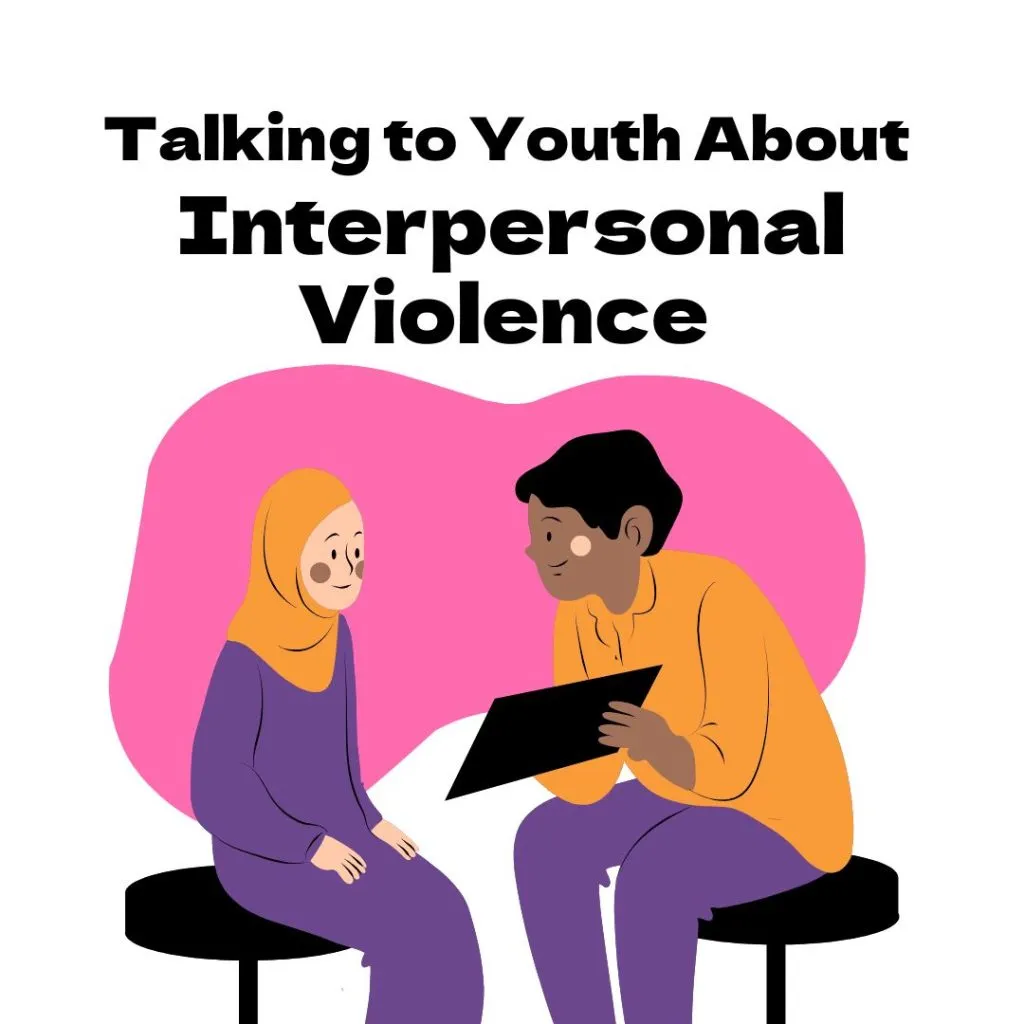As caregivers, we strive to protect our children from harm and prepare them for the challenges they may face in life. One crucial topic that often goes undiscussed is interpersonal violence. Having open conversations about this issue can equip youth with the knowledge and skills to recognize, avoid, and seek help in abusive situations. We hope this guide helps you navigate this important subject with the youth in your life.
Why It’s Important to Talk About Domestic Violence
Domestic violence affects people of all ages, genders, sexual orientations and backgrounds. According to the Centers for Disease Control, 1 in 12 teens in the US have experienced physical dating violence in this last year. Female and 2SLGBTQI+ youth face higher rates of physical and sexual dating violence.
By discussing safety in relationships, we can:
- Help the youth in our lives understand what constitutes abuse
- Help them recognize warning signs in their own or their friends’ relationships
- Provide information on available resources and support systems
- Empower them to seek help if they or someone they know is in an abusive situation
Tips for Talking to Youth About Interpersonal Violence
- Foster open dialogue: Encourage them to share their thoughts on relationships. Listen and allow them space to come to their own understanding and expectations for healthy relationships.
- Balance sensitivity and firmness: Be understanding and be willing to talk openly with the youth in your life, accepting that you might have different opinions. However, you should balance this with clear boundaries and expectations.
- Understand adolescent development: Recognize that teen behavior, including mood swings and risk-taking, is part of normal brain development.
- Acknowledge teen pressures: Be aware of the challenges teens face regarding sex, substance abuse, and dating. Be ready to listen without judgment and offer guidance.
- Take a clear stance: Clearly communicate your views on disrespect, abusive language, controlling behavior, and violence.
- Use “teachable moments”: Discuss healthy and unhealthy relationships using examples from media or real-life situations.
- Teach “upstander” behavior: Show teens how to support friends who may be in unhealthy relationships.
- Focus on positives: Highlight factors that contribute to healthy relationships, not just risks.
- Be actively involved: Take an interest in your youth’s life, friends, and activities.
- Accept imperfection: Acknowledge that you’ll make mistakes but continue to guide the youth in your life with sensitivity and firmness.
We suggest these conversations be ongoing. Keep the dialogue open and be patient with both yourself and the young person in your life as you navigate these important discussions.
Getting the Conversation Started
Respond offers a Parent’s Guide to Teen Dating Violence with some great conversation starters and suggested topics like:
Types of abuse: Explain that domestic violence isn’t just physical. It can be emotional, verbal, financial, or sexual abuse.
Warning signs: Discuss red flags such as excessive jealousy, controlling behavior, isolation from friends and family, and rapid mood swings.
Consent and boundaries: Emphasize the importance of mutual respect and the right to say “no” in any situation.
Digital abuse: Address how technology can be used for stalking, harassment, or control.
Bystander intervention: Teach them how to safely intervene or seek help if they witness abuse.
Alternatives to Peer Pressure: Reinforce the importance of being themselves and the power they have to choose the types of friendships and relationships they want.
Seeking help: Stress that it’s okay to ask for help and that there are resources available.
Remember, these conversations may be challenging, but they are crucial for your young person’s safety and well-being. By opening-up this dialogue, you’re not only protecting those you love but also contributing to a culture that doesn’t tolerate abuse.
Resources for Teens and Parents
- National Domestic Violence Hotline: Call 1-800-799-SAFE (7233) or text “START” to 88788
Website: www.thehotline.org
- Love Is Respect: Text “LOVEIS” to 22522 or call 1-866-331-9474
Website: www.loveisrespect.org
- The Trevor Project (for LGBTQ+ youth): Call 1-866-488-7386 or text “START” to 678678
Website: www.thetrevorproject.org
- RAINN (Rape, Abuse & Incest National Network): Call 1-800-656-HOPE (4673)
Website: www.rainn.org
- Break the Cycle:
Website: www.breakthecycle.org
If you or someone you know is in immediate danger, always call 911 or your local emergency services.

